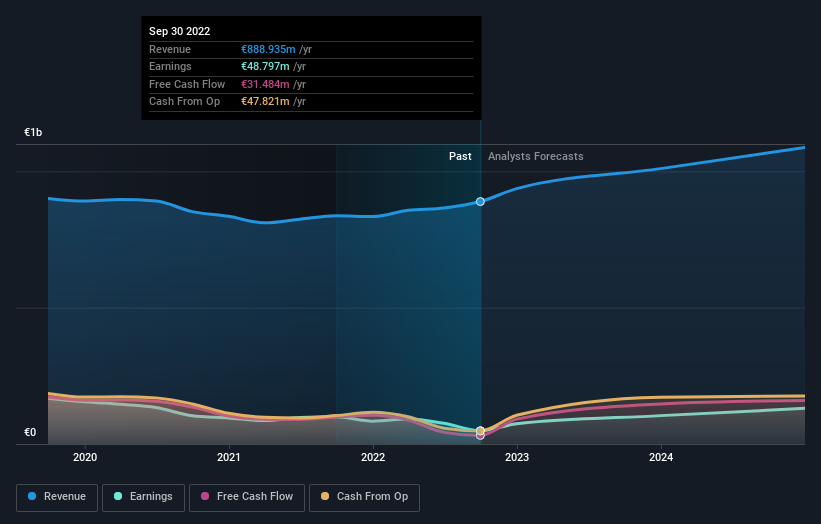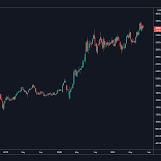Institutional owners may take dramatic actions as Software Aktiengesellschaft's (ETR:SOW) recent 4.2% drop adds to one-year losses
If you want to know who really controls Software Aktiengesellschaft (ETR:SOW), then you'll have to look at the makeup of its share registry. We can see that institutions own the lion's share in the company with 50% ownership. Put another way, the group faces the maximum upside potential (or downside risk).
As a result, institutional investors endured the highest losses last week after market cap fell by €78m. Needless to say, the recent loss which further adds to the one-year loss to shareholders of 33% might not go down well especially with this category of shareholders. Often called “market makers”, institutions wield significant power in influencing the price dynamics of any stock. As a result, if the downtrend continues, institutions may face pressures to sell Software, which might have negative implications on individual investors.
Let's delve deeper into each type of owner of Software, beginning with the chart below.
Our analysis indicates that SOW is potentially undervalued!

What Does The Institutional Ownership Tell Us About Software?
Institutions typically measure themselves against a benchmark when reporting to their own investors, so they often become more enthusiastic about a stock once it's included in a major index. We would expect most companies to have some institutions on the register, especially if they are growing.
As you can see, institutional investors have a fair amount of stake in Software. This implies the analysts working for those institutions have looked at the stock and they like it. But just like anyone else, they could be wrong. It is not uncommon to see a big share price drop if two large institutional investors try to sell out of a stock at the same time. So it is worth checking the past earnings trajectory of Software, (below). Of course, keep in mind that there are other factors to consider, too.

Investors should note that institutions actually own more than half the company, so they can collectively wield significant power. We note that hedge funds don't have a meaningful investment in Software. Our data shows that Software Ag Stiftung, Endowment Arm is the largest shareholder with 31% of shares outstanding. With 9.4% and 5.0% of the shares outstanding respectively, Kempen Capital Management N.V. and Schroder Investment Management Limited are the second and third largest shareholders.
To make our study more interesting, we found that the top 5 shareholders control more than half of the company which implies that this group has considerable sway over the company's decision-making.
While studying institutional ownership for a company can add value to your research, it is also a good practice to research analyst recommendations to get a deeper understand of a stock's expected performance. There are plenty of analysts covering the stock, so it might be worth seeing what they are forecasting, too.
Insider Ownership Of Software
The definition of company insiders can be subjective and does vary between jurisdictions. Our data reflects individual insiders, capturing board members at the very least. Management ultimately answers to the board. However, it is not uncommon for managers to be executive board members, especially if they are a founder or the CEO.
Insider ownership is positive when it signals leadership are thinking like the true owners of the company. However, high insider ownership can also give immense power to a small group within the company. This can be negative in some circumstances.
Our data cannot confirm that board members are holding shares personally. It is unusual not to have at least some personal holdings by board members, so our data might be flawed. A good next step would be to check how much the CEO is paid.
General Public Ownership
The general public, who are usually individual investors, hold a 18% stake in Software. While this size of ownership may not be enough to sway a policy decision in their favour, they can still make a collective impact on company policies.
Next Steps:
While it is well worth considering the different groups that own a company, there are other factors that are even more important. To that end, you should learn about the 2 warning signs we've spotted with Software (including 1 which is concerning) .
If you are like me, you may want to think about whether this company will grow or shrink. Luckily, you can check this free report showing analyst forecasts for its future.
NB: Figures in this article are calculated using data from the last twelve months, which refer to the 12-month period ending on the last date of the month the financial statement is dated. This may not be consistent with full year annual report figures.
New: Manage All Your Stock Portfolios in One Place
We've created the ultimate portfolio companion for stock investors, and it's free.
• Connect an unlimited number of Portfolios and see your total in one currency
• Be alerted to new Warning Signs or Risks via email or mobile
• Track the Fair Value of your stocks
Have feedback on this article? Concerned about the content? Get in touch with us directly. Alternatively, email editorial-team (at) simplywallst.com.
This article by Simply Wall St is general in nature. We provide commentary based on historical data and analyst forecasts only using an unbiased methodology and our articles are not intended to be financial advice. It does not constitute a recommendation to buy or sell any stock, and does not take account of your objectives, or your financial situation. We aim to bring you long-term focused analysis driven by fundamental data. Note that our analysis may not factor in the latest price-sensitive company announcements or qualitative material. Simply Wall St has no position in any stocks mentioned.
About XTRA:SOW
Software
Provides software development, licensing, maintenance, and IT services in Germany, the United States, and internationally.
Reasonable growth potential with mediocre balance sheet.
Similar Companies
Market Insights
Weekly Picks


Looking to be second time lucky with a game-changing new product

PlaySide Studios: Market Is Sleeping on a Potential 10M+ Unit Breakout Year, FY26 Could Be the Rerate of the Decade


Inotiv NAMs Test Center

This isn’t speculation — this is confirmation.A Schedule 13G was filed, not a 13D, meaning this is passive institutional capital, not acti
Recently Updated Narratives


The NAND Powerhouse Returns: Autonomy in the AI Era


Nuclear Resurgence: Powering the AI Grid of Tomorrow
Popular Narratives


Is Ubisoft the Market’s Biggest Pricing Error? Why Forensic Value Points to €33 Per Share


The "Physical AI" Monopoly – A New Industrial Revolution


Analyst Commentary Highlights Microsoft AI Momentum and Upward Valuation Amid Growth and Competitive Risks
Trending Discussion





